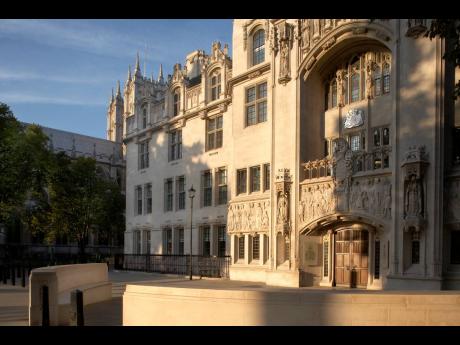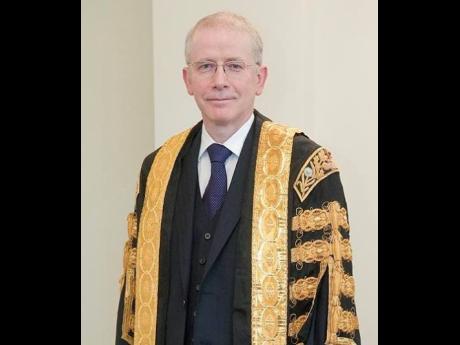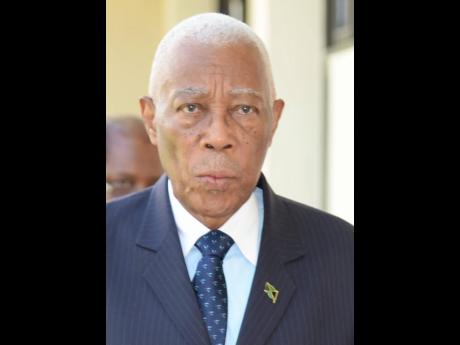A.J. Nicholson | Lord Reed and Jamaica’s loitering
Jamaicans cannot be sidetracked from journeying toward full decolonisation even with comforting reassurance from the Privy Council president, Lord Reed, that he and his brethren are honoured to serve us, coupled with an intransigent Jamaica Labour Party-led government continuing to wink at our loitering on the doorsteps of the erstwhile coloniser.
Almost 200 years after Jamaica became wedded to the British Court in 1833, one out of every four Jamaicans, according to a recent poll – 23 per cent, a column which the governing party leadership occupies – urges Jamaica’s continued loitering.
While Lord Reed recently felt obliged to comment on Jamaicans’ connection to his court, Jamaica’s head of Government, in addressing the 80th anniversary conference of his governing party, did not consider the simmering deficiencies at the highest echelons of the justice system merited a mention.
Not a word was heard from the prime minister on an issue which, according to the same poll, almost two out of every three Jamaicans – 59 per cent – are concerned about regularising the intolerable situation at the apex of the judiciary arm of government.
But isn’t it rather odd that Lord Reed should have thought it necessary to comment publicly in a letter to the editor, whose main thrust was concerned with Jamaica’s lingering, and which by no means suggested any call for a reaction from the British authorities?
It is odd because, as former Prime Minister P.J. Patterson has stated, Lord Reed came up short, far short. While over time there would have been disagreement with the reasoning in their advice, Jamaicans have never adversely criticised the court itself. Neither has there been any expression of ingratitude shown toward their lordships’ continued industry.
What is inescapable, however, is a handicap, identified by Lord Brougham, the architect of the character that the Privy Council would eventually assume, in 1828 even before that court came into existence. Try as Lord Reed and his brethren might, circumstances completely beyond their control have stymied their ultimate required competence to be our judges of last resort.
Lord Brougham raised the issue of that lasting dilemma by suggesting “removing British colonies from the jurisdiction of the Court on the grounds of distance from the United Kingdom and the immense variety of matters arising from them which would be foreign to British habits”.
Lord Reed sought to address the matter of distance by reference to his court offering hearings online; but there is no answer to the immutable handicap of matters arising which are foreign to British habits, a main reason why almost all former colonies have delinked from the Privy Council, and which should have long helped to put paid to Jamaica’s loitering.
LOITERING HAS TO BE ABANDONED
In seeking to create the just society, that loitering has to be abandoned. It did not appear to be within Lord Reed’s upfront contemplation. But then, too, it has not been expressed by Jamaica’s present governing leadership to be of any concern to them.
Lord Reed, though, is enmeshed in an entanglement caused by a strident declaration in his letter: “I must challenge the suggestion in your editorial that we consider that cases from outside the UK take up too much of our time”. He continued, emphatically: “This could not be further from the truth”.
First, that is not a “suggestion” of The Gleaner; nor did the assertion originate in Jamaica. There would be a record of its origin in his own office. In 2009, Lord Nicholas Phillips, his predecessor as the first head of the UK Supreme Court, issued a warning to the authorities in the remaining independent territories, which are mostly located in the Caribbean, that still make use of the Privy Council.
In an interview with the Financial Times, he warned that changes would be made. His senior judges, he maintained, were spending as much as 40 per cent of their judicial time on Privy Council matters, which was “disproportionate”.
His proposed solution was that, should those states refuse to attach themselves to a final court within their own sphere (the Caribbean Court of Justice?), judges who have served at Court of Appeal level would be drafted onto Privy Council panels, to ease the burden on his senior judges.
That warning has since been carried out, and Lord Reed is best positioned to say whether the practice still exists of drafting judges from a lower court onto his panels to adjudicate in the highest court, and to speak to the origin of the policy.
Of course, no challenge can be made to Lord Reed regarding his strong assertions. What, however, passes all understanding is how, for Jamaica’s governing party, the carrying out of that unprecedented warning has meant nothing: continued loitering even in such circumstances is, shamelessly, of no moment.
WHAT REASON ...
What reason could Lord Reed have had for penning that letter? What could he have in mind by seeking “to convey to your readers” information that he imagines they do not have? The readers surely need no reminding that “(T)he decision whether Jamaica retains the JCPC is entirely one for the Jamaican Government and people”. Only the government leaders need that reminder, not the readers.
What reason for publicly giving this guarantee that he and his brethren “will continue to consider it a privilege to serve as the final court of appeal, unless and until Jamaica decides otherwise”; and that promise extended to all the independent territories that still make use of his court?
Jamaicans cannot be sidetracked. The messages that His Lordship has conveyed have not removed the impediments that prevent the vast majority of Jamaicans from making use of their court of last resort. Those obstacles have long called for abandoning the loitering in order to satisfy the developmental requirement of unimpeded access to justice in all our courts of law.
Lord Phillips had sought to address an issue which he considered to be a hindrance to the proper delivery of service by his court. But, like several Privy Council judges over time, he was judiciously insistent that the independent states should stop using the Privy Council.
For example, one of Lord Reed’s celebrated predecessors, Lord Leonard Hoffman, addressing the legal fraternity in Trinidad and Tobago in 2003, with the inauguration of the regional court drawing near, emphasising the intricate link between access to justice and sustainable development, advised that: “... a local final court would be necessary and beneficial to transform society in partnership with the other branches of government”.
Lord Reed would be well aware of the Caribbean Court of Justice, and the ongoing conversation in Jamaica concerning delinking from his court to accede to the full jurisdiction of that institution.
He would recall that, when the issue came before the Privy Council, even before the inauguration of the court itself, the judges, in giving their prophetic authoritative stamp of approval, declared that the Caribbean people had endeavoured “to create a regional court of high quality and complete independence enjoying all the advantages that a regional court could hope to enjoy”.
Significantly, the imprimatur of the judges of the highest court, over which Lord Reed now presides, has helpfully played its part by providing well-founded guidance for Jamaica’s government, urgently, to play its part by addressing the inexplicable, misguided loitering which would reap positive outcomes both for the British and the Jamaican judiciary systems.
A.J. Nicholson is former minister of justice of Jamaica. Send feedback to columns@gleanerjm.com



